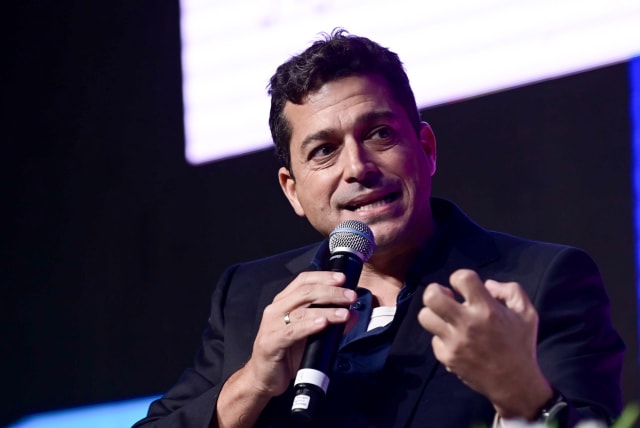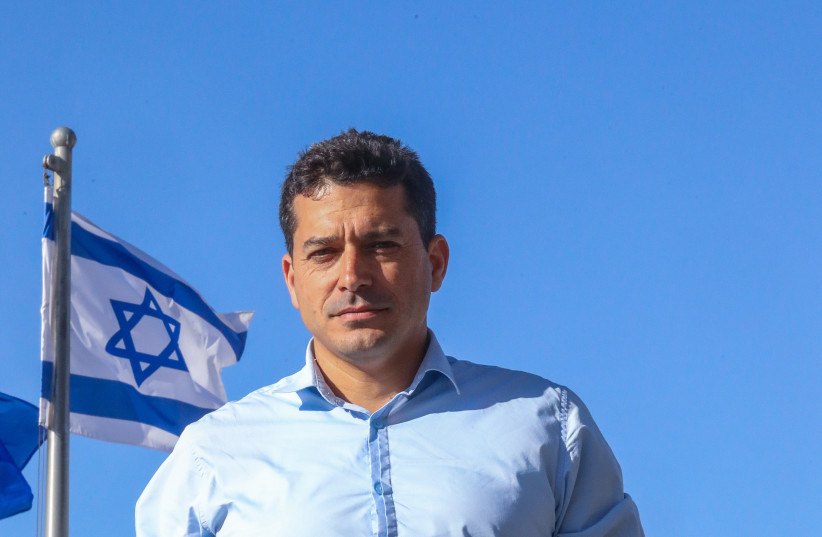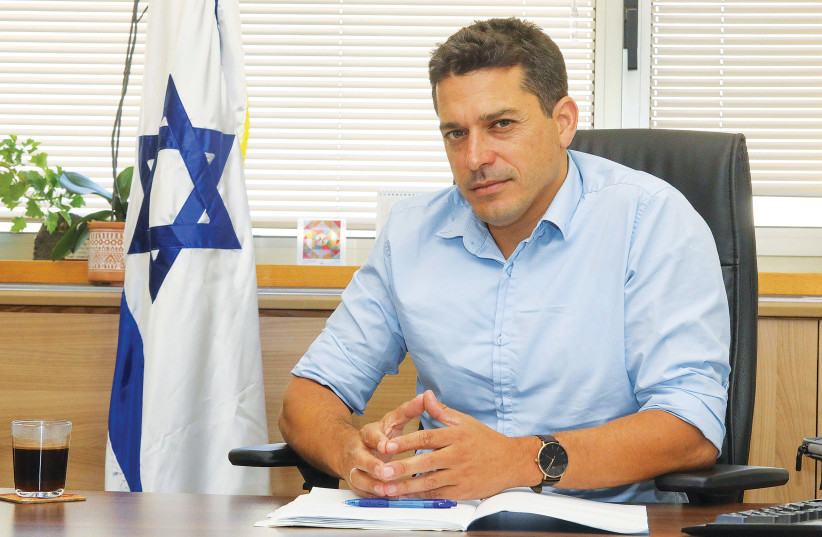Chikli wants US to butt out, but Jerusalem needs US help in the UN - analysis

Nides can chide Israel all he wants, but it would be more effective if he would do so in private. In public, it triggers comments like those of Chikli.
Diaspora Affairs and Combatting Antisemitism Minister Amichai Chikli had four English words for US Ambassador Thomas Nides on Sunday morning: “Mind your own business.”
The timing of those words was as unfortunate as the style was brash.
Why unfortunate? Just as Chikli was telling the US to mind its own business when it comes to the coalition’s controversial judicial reform, it is hoping Washington does not mind its own business and gets involved in stymieing an anti-settlement resolution in the UN Security Council on Monday.
Chikli to US: Stay out of judicial reform; Jerusalem to US: Help us in the UN
As Chikli was telling the US to stay out of Israel’s affairs, Jerusalem was hoping that the US succeeded in persuading the Palestinians to make do with a presidential statement at the Security Council and not push forward with a resolution condemning Israel for its decision last week to authorize nine unauthorized settlements and green-light the construction of some 10,000 new units in Judea and Samaria.
In other words, Chikli wants the US to stay out of things regarding judicial reform, but very much get involved in security and diplomatic issues.
The problem is, and Chikli certainly understands this, is that things don’t work that way. You can’t expect friends to stand up for you when things get rough, but the rest of the time remain mute.
No country wants another country to get involved in its internal business: not Israel, not the US. But when the government embarks on a policy that the US feels is going to weaken Israel’s democratic institutions – and the US has for decades based its support for Israel on shared democratic values – it is only a matter of time before they will sound off.
US Secretary of State Antony Blinken did it when he was here and met Prime Minister Benjamin Netanyahu a couple of weeks ago. US President Joe Biden did it last week with a written response to a question posed by New York Times columnist Tom Friedman. And Nides did it in a CNN podcast released Saturday with former Obama administration senior official David Axelrod.
In the first few minutes of a 45-minute interview where Axelrod was unsparing in his efforts to place the burden of the onus of the current problems with the Palestinians squarely on Israel’s shoulders – doing so while reminding listeners of his Jewish background – Nides misspoke.
It’s not what he said as much as how he said it.
“The United States is not going to be in a position to dictate to Israel how to pick the Supreme Court, Okay,” Nides said. “However, to be clear, the one thing that binds our countries together is a sense of democracy, and a sense of democratic institutions. That is how we defend Israel at the UN. We stand up for the values we share, and when we believe that the democratic institutions are under stress and strain, we articulate.”
And that, he said, “is what we are doing now. We are telling the prime minister, like I tell my kids, to pump the brakes. Slow down, try to get a consensus, bring the parties together, which is very complicated – you’re trying to do things way too fast, pump the brakes.”
The problem is that no country likes to be likened to an ambassador’s children. It sounds condescending.
And that condescending tone is what is going to make the headlines. And it did. Much more so than other things Nides said in the interview, such as: “We are going to support Israel, just so there is no misunderstanding about that, we’ve got Israel’s back.”
And this: “Both on security and at the UN, we will work with them, we are going to get through this period of time.” Or this: “Again, I want to be clear the United States is not sitting here telling Israel how they should pick their Supreme Court, or what they should be doing on judicial reform, beyond the fact that we believe that strong democratic values and democratic institutions are critical to our relationship, and try to build consensus among your people.”
It is doubtful that Chikli listened to the entire interview, rather, he seems to have only heard or read the headlines about “pumping the brakes.”
Did Amichai Chikli listen to the whole interview with Nides? Probably not
And to that, he said: “I tell the American ambassador, you pump the brakes. Mind your own business. You are not sovereign here to discuss judicial reforms. We’re happy to discuss diplomatic and security matters with you but respect our democracy.”
Nides said something else that Chikli did not respond to, which should send off warning signals, that there is a linkage between issues like judicial reform and settlement construction, and Iran and peace with other Arab countries.
“The reality is, the prime minister wants to do big things, he tells us he wants to do big things,” Nides said. “Big things include Iran, and what is going on with Iran, which is a massive security risk for Israel and quite frankly for the Middle East and the US.
“Second, he would like to expand the Abraham Accords and get Saudi Arabia involved, which would ultimately help the security of Israel. In both cases, America plays an important role in all of this. Everything we do, that Israel does, we play an important role in. So we have plenty of things we are working collectively on, and as I said to the prime minister a hundred times, we can’t spend time on things we want to work on together if your backyard is on fire.”
What is important for everyone to realize, Israel as well as the US ambassador to Israel, is that words and actions have consequences.
Yes, Chikli, Israel is a sovereign state and can make up its mind about judicial reform. But if it goes through with the judicial reform as laid out by Justice Minister Yariv Levin, there will be consequences – one of which is the weakening of US support. Not the loss of US support, as Yesh Atid’s Yair Lapid is warning, but an erosion of that support that can then become manifest in a multitude of different ways, including not supporting Israel to the extent it wants regarding Iran, and in not nudging Arab countries in the region toward closer relations with the Jewish state.
By the way, Nides was full of praise for President Isaac Herzog’s attempts at mediation, and called on the opposition, as well as the government, to come to the table and “work this out.”
Nides needs to learn: His words have consequences
Just as there are consequences for Israeli actions, Nides also needs to understand that there are consequences to his words.
His interview, or at least the parts of the interview that the Israeli media took notice of, will not endear him with this government or with large swaths of the population. To be an effective ambassador, he must have a good relationship with the government and the country’s leaders. Words such as “like I tell my children” will not endear him to the government and won’t make his already difficult job any easier.
Just ask the former ambassador to the US Ron Dermer. At the height of the friction between Netanyahu and then-US president Barack Obama over the Iranian nuclear deal, Dermer was widely perceived – rightly or wrongly – as getting involved in US domestic affairs by orchestrating Netanyahu’s 2015 speech to Congress. Some perceived him as being a very partisan envoy, something that did not make his job in Washington any easier.
There is another lesson to be learned from the Nides interview.
One of the reasons that the US-Israel relationship has sailed pretty smoothly since the beginning of the Biden administration – despite not insignificant policy disagreements over everything from Iran to Ukraine to the Palestinians – is that those disagreements were not aired publicly.
Nides can chide Israel all he wants, but it would be more effective if he would do so in private. In public, it triggers comments like those of Chikli, which adds more fuel to the fire and unnecessary tension to the relationship.
No surprise that this public display of annoyance – first Nides’s then Chikli’s – began on a podcast hosted by Axelrod, a crucial player in an Obama administration that sought publicly to place daylight between the US and Israel. Biden has done his best to avoid that. It would be counterproductive if that policy would change now.
Jerusalem Post Store
`; document.getElementById("linkPremium").innerHTML = cont; var divWithLink = document.getElementById("premium-link"); if (divWithLink !== null && divWithLink !== 'undefined') { divWithLink.style.border = "solid 1px #cb0f3e"; divWithLink.style.textAlign = "center"; divWithLink.style.marginBottom = "15px"; divWithLink.style.marginTop = "15px"; divWithLink.style.width = "100%"; divWithLink.style.backgroundColor = "#122952"; divWithLink.style.color = "#ffffff"; divWithLink.style.lineHeight = "1.5"; } } (function (v, i) { });


